Question: in c++ Question 1(55 pts): Implement the following classes: A) (15 pts) class Book with the following members. 1. private members: a. book title (string)
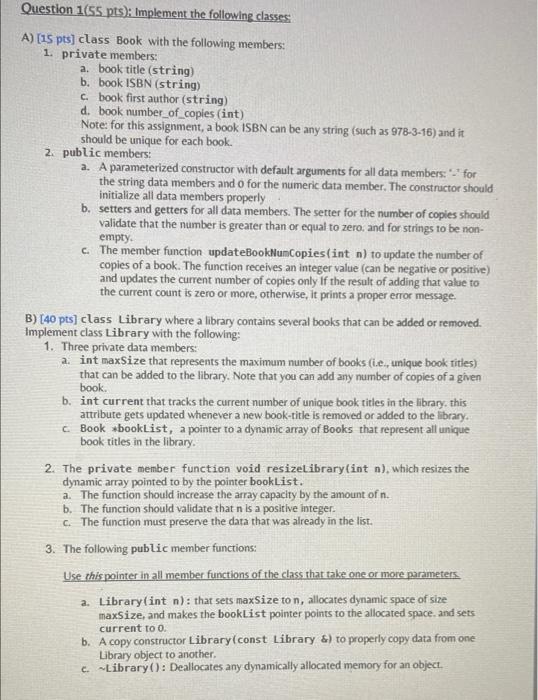
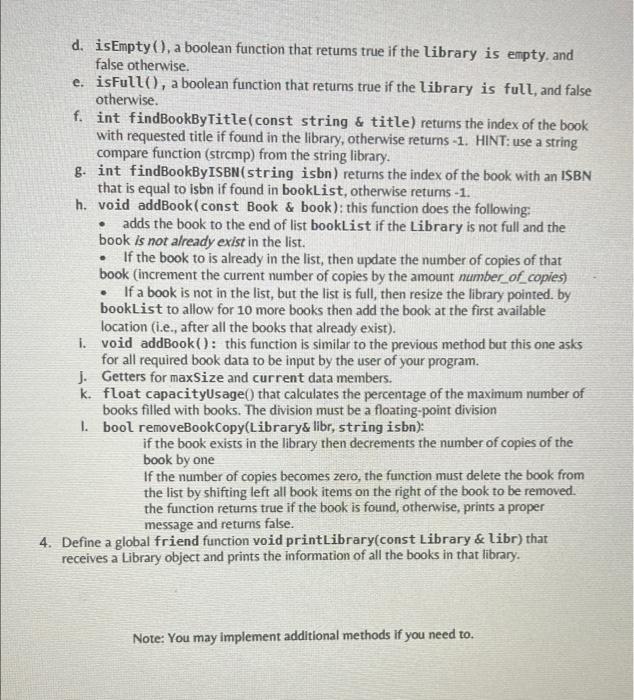
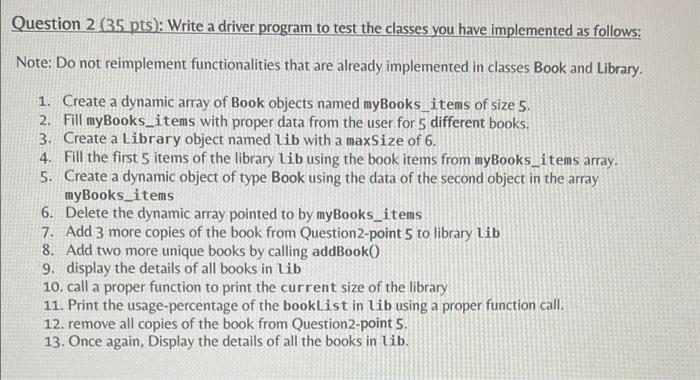
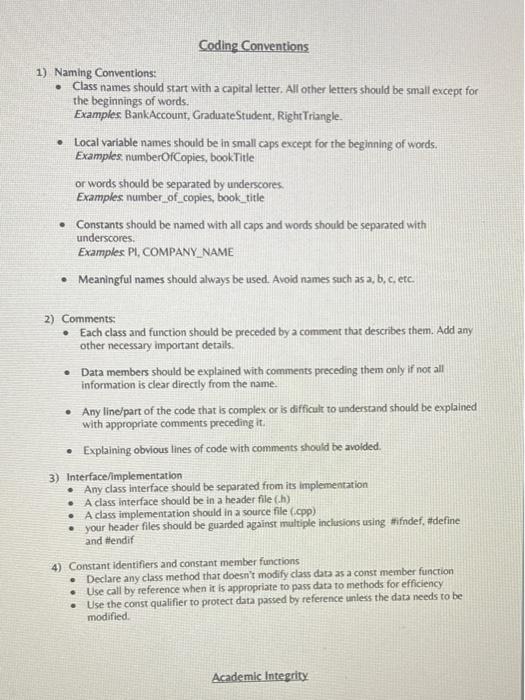
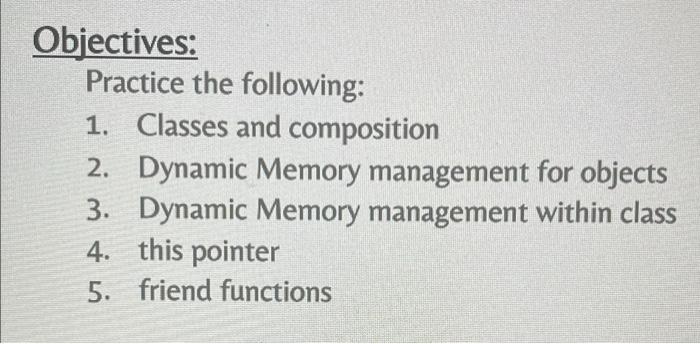

Question 1(55 pts): Implement the following classes: A) (15 pts) class Book with the following members. 1. private members: a. book title (string) b. book ISBN (string) c book first author (string) d. book number_of_coples (int) Note: for this assignment, a book ISBN can be any string (such as 978-3-16) and it should be unique for each book. 2. public members: a. A parameterized constructor with default arguments for all data members: "2" for the string data members and o for the numeric data member. The constructor should initialize all data members properly b. setters and getters for all data members. The setter for the number of copies should validate that the number is greater than or equal to zero, and for strings to be non- empty, c. The member function updateBookNunCopies(int n) to update the number of copies of a book. The function receives an integer value (can be negative or positive) and updates the current number of copies only if the result of adding that value to the current count is zero or more, otherwise, it prints a proper error message. B) (40 pts) class Library where a library contains several books that can be added or removed. Implement class Library with the following: 1. Three private data members: a int maxSize that represents the maximum number of books (t.e., unique book titles) that can be added to the library. Note that you can add any number of copies of a given book. b. int current that tracks the current number of unique book titles in the library, this attribute gets updated whenever a new book-title is removed or added to the library. c Book #booklist, a pointer to a dynamic array of Books that represent all unique book titles in the library. 2. The private member function void resizeLibrary(int n), which resizes the dynamic array pointed to by the pointer booklist. a. The function should increase the array capacity by the amount of n. b. The function should validate that n is a positive integer. c. The function must preserve the data that was already in the list. 3. The following public member functions: Use this pointer in all member functions of the class that take one or more parameters 2. Library(int n): that sets maxSize to n, allocates dynamic space of size maxSize, and makes the booklist pointer points to the allocated space and sets current to o b. A copy constructor Library(const Library &) to properly copy data from one Library object to another, c. Library(): Deallocates any dynamically allocated memory for an object. . d. isEmpty(), a boolean function that retums true if the library is empty, and false otherwise. e. isFull(), a boolean function that returns true if the library is full, and false otherwise. f. int findBookByTitle(const string & title) returns the index of the book with requested title if found in the library, otherwise returns -1. HINT: use a string compare function (strcmp) from the string library. g. int findBookByISBN(string isbn) returns the index of the book with an ISBN that is equal to Isbn if found in booklist, otherwise retums - 1. h. void addBook(const Book & book): this function does the following: adds the book to the end of list booklist if the Library is not full and the book is not already exist in the list. If the book to is already in the list, then update the number of copies of that book (increment the current number of copies by the amount number_of_copies) If a book is not in the list, but the list is full, then resize the library pointed. by booklist to allow for 10 more books then add the book at the first available location (i.e., after all the books that already exist). 1. void addBook(): this function is similar to the previous method but this one asks for all required book data to be input by the user of your program. J. Getters for maxSize and current data members. k. float capacityUsage() that calculates the percentage of the maximum number of books filled with books. The division must be a floating-point division 1. bool removeBookCopy(Library& libr, string isbn): if the book exists in the library then decrements the number of copies of the book by one If the number of copies becomes zero, the function must delete the book from the list by shifting left all book items on the right of the book to be removed. the function retums true if the book is found, otherwise, prints a proper message and returns false. 4. Define a global friend function void printLibrary(const Library & libr) that receives a Library object and prints the information of all the books in that library. Note: You may implement additional methods if you need to Question 2 (35 pts): Write a driver program to test the classes you have implemented as follows: Note: Do not reimplement functionalities that are already implemented in classes Book and Library. 1. Create a dynamic array of Book objects named myBooks_items of size 5. 2. Fill myBooks_items with proper data from the user for 5 different books. 3. Create a Library object named Uib with a maxSize of 6. 4. Fill the first 5 items of the library lib using the book items from myBooks_items array. 5. Create a dynamic object of type Book using the data of the second object in the array myBooks_items 6. Delete the dynamic array pointed to by myBooks_items 7. Add 3 more copies of the book from Question2-point 5 to library Lib 8. Add two more unique books by calling addBook() 9. display the details of all books in lib 10. call a proper function to print the current size of the library 11. Print the usage-percentage of the booklist in lib using a proper function call. 12. remove all copies of the book from Question2-point 5. 13. Once again, Display the details of all the books in lib. Coding Conventions 1) Naming Conventions: Class names should start with a capital letter. All other letters should be small except for the beginnings of words. Examples Bank Account, Graduate Student, Right Triangle Local variable names should be in small caps except for the beginning of words. Examples numberOfCopies, book Title or words should be separated by underscores. Examples number of copies, book_title Constants should be named with all caps and words should be separated with underscores. Examples PI, COMPANY_NAME Meaningful names should always be used. Avoid names such as a, b, c. etc. 2) Comments: Each class and function should be preceded by a comment that describes them. Add any other necessary important details. Data members should be explained with comments preceding them only if not all information is clear directly from the name. Any line/part of the code that is complex or is difficult to understand should be explained with appropriate comments preceding it. Explaining obvious lines of code with comments should be avoided. 3) Interface/implementation Any class interface should be separated from its implementation A class interface should be in a header filech) A class implementation should in a source file (.cpp) your header files should be guarded against multiple inclusions using #ifndef, #define and tendit 4) Constant identifiers and constant member functions Declare any class method that doesn't modify class dara as a const member function Use call by reference when it is appropriate to pass data to methods for efficiency Use the const qualifier to protect data passed by reference unless the data needs to be modified Academic Integrity Objectives: Practice the following: 1. Classes and composition 2. Dynamic Memory management for objects 3. Dynamic Memory management within class 4. this pointer 5. friend functions o Question 1.B.3.1 in the assignment asks to implement the method bool removeBookCopy(Library& libr, string isbn) This method doesn't need the first parameter, so it should be:bool removeBookCopy(string isbn) Question 1(55 pts): Implement the following classes: A) (15 pts) class Book with the following members. 1. private members: a. book title (string) b. book ISBN (string) c book first author (string) d. book number_of_coples (int) Note: for this assignment, a book ISBN can be any string (such as 978-3-16) and it should be unique for each book. 2. public members: a. A parameterized constructor with default arguments for all data members: "2" for the string data members and o for the numeric data member. The constructor should initialize all data members properly b. setters and getters for all data members. The setter for the number of copies should validate that the number is greater than or equal to zero, and for strings to be non- empty, c. The member function updateBookNunCopies(int n) to update the number of copies of a book. The function receives an integer value (can be negative or positive) and updates the current number of copies only if the result of adding that value to the current count is zero or more, otherwise, it prints a proper error message. B) (40 pts) class Library where a library contains several books that can be added or removed. Implement class Library with the following: 1. Three private data members: a int maxSize that represents the maximum number of books (t.e., unique book titles) that can be added to the library. Note that you can add any number of copies of a given book. b. int current that tracks the current number of unique book titles in the library, this attribute gets updated whenever a new book-title is removed or added to the library. c Book #booklist, a pointer to a dynamic array of Books that represent all unique book titles in the library. 2. The private member function void resizeLibrary(int n), which resizes the dynamic array pointed to by the pointer booklist. a. The function should increase the array capacity by the amount of n. b. The function should validate that n is a positive integer. c. The function must preserve the data that was already in the list. 3. The following public member functions: Use this pointer in all member functions of the class that take one or more parameters 2. Library(int n): that sets maxSize to n, allocates dynamic space of size maxSize, and makes the booklist pointer points to the allocated space and sets current to o b. A copy constructor Library(const Library &) to properly copy data from one Library object to another, c. Library(): Deallocates any dynamically allocated memory for an object. . d. isEmpty(), a boolean function that retums true if the library is empty, and false otherwise. e. isFull(), a boolean function that returns true if the library is full, and false otherwise. f. int findBookByTitle(const string & title) returns the index of the book with requested title if found in the library, otherwise returns -1. HINT: use a string compare function (strcmp) from the string library. g. int findBookByISBN(string isbn) returns the index of the book with an ISBN that is equal to Isbn if found in booklist, otherwise retums - 1. h. void addBook(const Book & book): this function does the following: adds the book to the end of list booklist if the Library is not full and the book is not already exist in the list. If the book to is already in the list, then update the number of copies of that book (increment the current number of copies by the amount number_of_copies) If a book is not in the list, but the list is full, then resize the library pointed. by booklist to allow for 10 more books then add the book at the first available location (i.e., after all the books that already exist). 1. void addBook(): this function is similar to the previous method but this one asks for all required book data to be input by the user of your program. J. Getters for maxSize and current data members. k. float capacityUsage() that calculates the percentage of the maximum number of books filled with books. The division must be a floating-point division 1. bool removeBookCopy(Library& libr, string isbn): if the book exists in the library then decrements the number of copies of the book by one If the number of copies becomes zero, the function must delete the book from the list by shifting left all book items on the right of the book to be removed. the function retums true if the book is found, otherwise, prints a proper message and returns false. 4. Define a global friend function void printLibrary(const Library & libr) that receives a Library object and prints the information of all the books in that library. Note: You may implement additional methods if you need to Question 2 (35 pts): Write a driver program to test the classes you have implemented as follows: Note: Do not reimplement functionalities that are already implemented in classes Book and Library. 1. Create a dynamic array of Book objects named myBooks_items of size 5. 2. Fill myBooks_items with proper data from the user for 5 different books. 3. Create a Library object named Uib with a maxSize of 6. 4. Fill the first 5 items of the library lib using the book items from myBooks_items array. 5. Create a dynamic object of type Book using the data of the second object in the array myBooks_items 6. Delete the dynamic array pointed to by myBooks_items 7. Add 3 more copies of the book from Question2-point 5 to library Lib 8. Add two more unique books by calling addBook() 9. display the details of all books in lib 10. call a proper function to print the current size of the library 11. Print the usage-percentage of the booklist in lib using a proper function call. 12. remove all copies of the book from Question2-point 5. 13. Once again, Display the details of all the books in lib. Coding Conventions 1) Naming Conventions: Class names should start with a capital letter. All other letters should be small except for the beginnings of words. Examples Bank Account, Graduate Student, Right Triangle Local variable names should be in small caps except for the beginning of words. Examples numberOfCopies, book Title or words should be separated by underscores. Examples number of copies, book_title Constants should be named with all caps and words should be separated with underscores. Examples PI, COMPANY_NAME Meaningful names should always be used. Avoid names such as a, b, c. etc. 2) Comments: Each class and function should be preceded by a comment that describes them. Add any other necessary important details. Data members should be explained with comments preceding them only if not all information is clear directly from the name. Any line/part of the code that is complex or is difficult to understand should be explained with appropriate comments preceding it. Explaining obvious lines of code with comments should be avoided. 3) Interface/implementation Any class interface should be separated from its implementation A class interface should be in a header filech) A class implementation should in a source file (.cpp) your header files should be guarded against multiple inclusions using #ifndef, #define and tendit 4) Constant identifiers and constant member functions Declare any class method that doesn't modify class dara as a const member function Use call by reference when it is appropriate to pass data to methods for efficiency Use the const qualifier to protect data passed by reference unless the data needs to be modified Academic Integrity Objectives: Practice the following: 1. Classes and composition 2. Dynamic Memory management for objects 3. Dynamic Memory management within class 4. this pointer 5. friend functions o Question 1.B.3.1 in the assignment asks to implement the method bool removeBookCopy(Library& libr, string isbn) This method doesn't need the first parameter, so it should be:bool removeBookCopy(string isbn)
Step by Step Solution
There are 3 Steps involved in it

Get step-by-step solutions from verified subject matter experts


